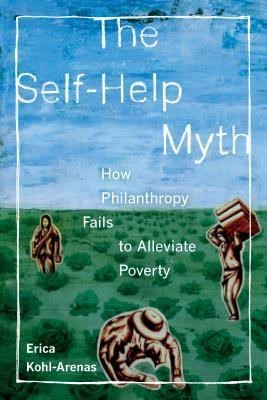Erica Kohl-Arenas' new book, "The Self-help Myth: How Philanthropy Fails to Alleviate Poverty" (2016) offer strong criticism of philanthropic work, by asking "Can the surplus of capitalist exploitation be used to aid those on whose backs this surplus is generated? Can these surplus dollars contribute to addressing entrenched poverty while refusing to address systematic questions of labor, migration, and human rights?" (p. 36). Quote for this edition of the "thought provokers" series offers interesting food for thought, and space for critical reflection:
While the author continues to work in the sector, and with funders, she argues the prospects for transformative change appear minimal. She concludes, "on the one hand, this research confirms the expected – that private philanthropy will not fund projects that attempt to make significant changes in the economic sphere or address the structural causes of poverty and inequality" (p. 74-75). However, the book also offer nuance, the author continues: "On the other hand, a story of top-down co-optation and control, as presented in much of the critical philanthropy scholarship, is insufficient in explaining the relationship between the movement and funders in that it neglects the complicated negotiations between foundations and movement leadership." (p. 75).
The pitch:
- "This book shows how private foundations maintain systems of inequality by funding individualistic programs that appear to address poverty but that in practice often avoid the root causes of the problems foundations propose to solve… just an in resource-rich regions of the global South, poverty is produced through relationships of capital production, often hidden from sight, amidst great wealth." (p. 4)
- "Recent critical global development scholarship describes the participation of the poor in programs such as microcredit and conditional cash transfer programs as representing a new neoliberal rationality that structures the lives of the poor around solving their own problems while obscuring the capitalist relationships that maintain poverty in the global South." (p. 25)
A way forward?
- "Without listening to the people who still have passion, dreams, and hope, and who are not consumed with grant-reporting obligations and the next funding trend, we will not know what is possible." (p. 180)

